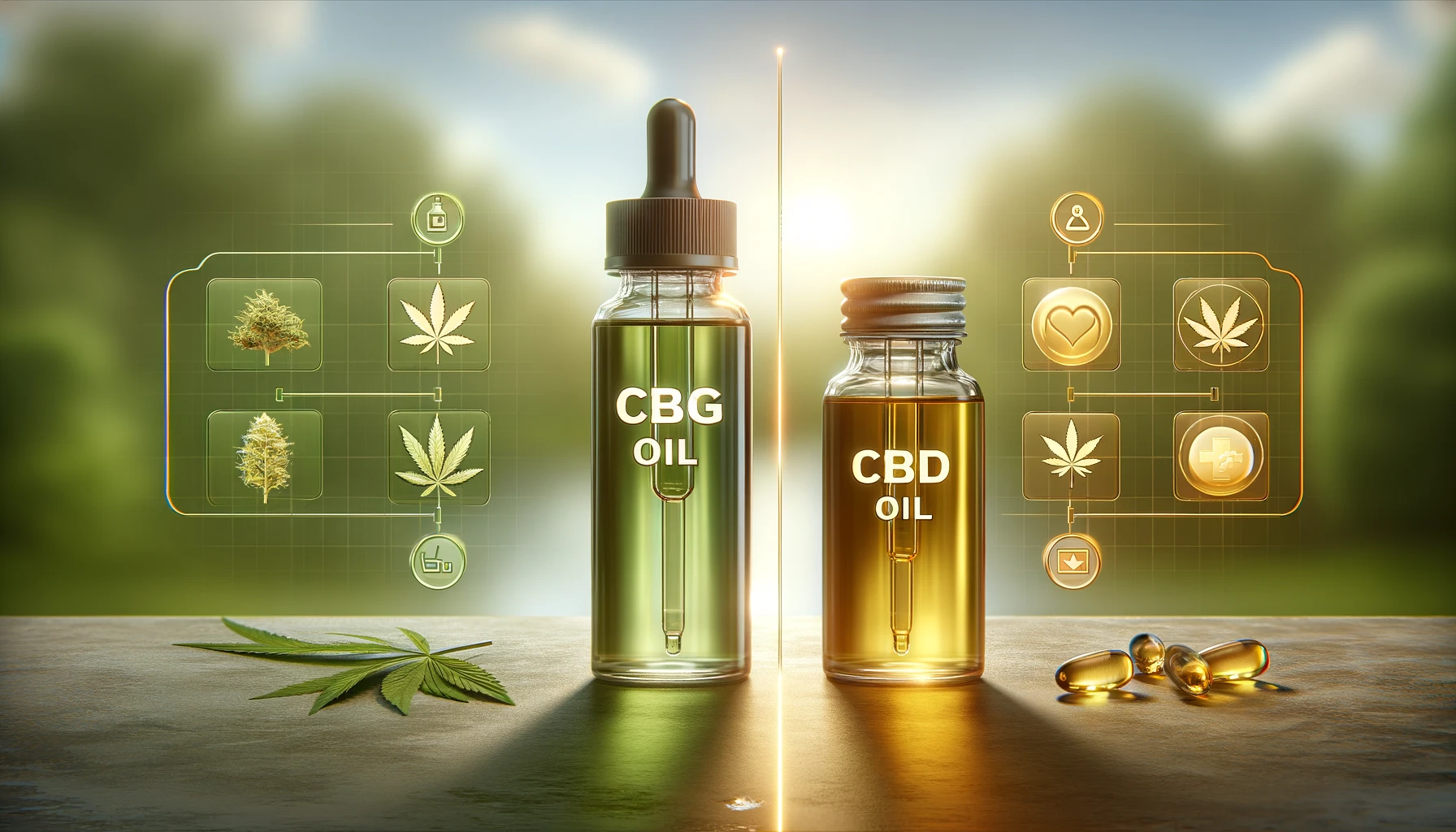1. Introduction
In the rapidly evolving world of cannabis research, two cannabinoids have garnered significant interest: CBG (Cannabigerol) and CBD (Cannabidiol). While CBD has become a household name due to its widespread availability and extensive research, CBG is emerging as a compound of interest with unique properties. This comprehensive guide aims to elucidate the differences between these two cannabinoids, delving into their chemical structure, benefits, potential side effects, legality, and consumer considerations. By understanding these aspects, consumers and enthusiasts can make informed decisions about their use in various therapeutic contexts.
2. Background Information
Cannabinoids are naturally occurring compounds found in the Cannabis sativa plant. Over 100 different cannabinoids have been identified, each with unique properties and effects. The discovery of the endocannabinoid system in the human body, a complex network of receptors that interact with these cannabinoids, has led to a surge in interest regarding their potential therapeutic applications.
CBG, often less concentrated in cannabis plants compared to CBD and THC, is known as the “mother cannabinoid.” It’s the chemical precursor to other cannabinoids, including CBD and THC. Historically, both CBG and CBD have been used in various cultures for medicinal purposes, but it’s only in recent decades that scientific research has begun to uncover their specific effects and potential medical benefits.
The legal status of these cannabinoids has been a subject of much debate. While the 2018 Farm Bill in the United States federally legalized hemp-derived CBD with less than 0.3% THC, the legal status of CBG is still evolving, and laws vary significantly across countries and states.
3. Chemical Structure and Production
On a molecular level, CBG and CBD are distinctly different, which accounts for their differing effects on the human body. CBG is often found in lower concentrations in the cannabis plant, especially in mature plants where most CBG has been converted into other cannabinoids. This makes the extraction process more challenging and expensive. In contrast, CBD is abundant in many strains of hemp, making it more accessible and cost-effective to produce.
These structural differences also influence how these cannabinoids interact with the body’s endocannabinoid system. While CBD has a low affinity for cannabinoid receptors and acts mostly through indirect interactions, CBG directly interacts with CB1 and CB2 receptors in the brain.
4. Benefits and Uses
The therapeutic potential of CBG is being actively researched, with early studies suggesting its effectiveness in treating conditions like inflammatory bowel disease, glaucoma, and even certain cancers. CBG has also shown promise in neuroprotective applications, potentially benefiting patients with disorders such as Huntington’s disease.
CBD, on the other hand, is well-known for its anti-inflammatory, analgesic, and anxiolytic properties. It has been widely used for conditions such as chronic pain, anxiety, depression, and insomnia. CBD’s efficacy in treating certain forms of epilepsy has led to the FDA approval of Epidiolex, a CBD-based medication.
Comparatively, while CBD’s benefits are backed by more substantial research, CBG’s potential is just beginning to be explored. It’s important for consumers to understand that while both cannabinoids show promise, their effects can vary significantly.
5. Side Effects and Safety
Both CBG and CBD are considered safe, with few and generally mild side effects. CBG’s side effects are less documented due to limited research but may include mild gastrointestinal issues, headaches, and fatigue. CBD is known to cause side effects such as dry mouth, reduced appetite, drowsiness, and sometimes diarrhea or nausea.
However, the safety profile of these cannabinoids is still being studied. Long-term effects and interactions with other medications are areas of ongoing research. Consumers should approach these oils with caution, particularly if they have pre-existing health conditions or are taking other medications.
6. Legality and Availability
The legal landscape for CBG and CBD is complex and varies widely. In many regions, CBD oil derived from hemp with less than 0.3% THC is legal, but this can vary. CBG’s legal status is unclear, primarily due to its recent emergence in the consumer market. It’s essential for potential users to stay informed about their local laws regarding cannabinoid use to ensure compliance and avoid legal complications.
7. Consumer Considerations
When choosing between CBG and CBD oil, consumers should consider several factors. The intended use, whether for general wellness or specific health conditions, is crucial. Potency and purity are also important, as is the source of the oil. Reputable manufacturers and suppliers should provide third-party lab testing results to verify the content and quality of their products.
For those new to cannabinoids, starting with a low dose and gradually increasing it while monitoring its effects is advisable. Consulting healthcare professionals, particularly for those with pre-existing conditions or taking other medications, is also recommended.
8. Current Research and Future Prospects
The body of research on CBG is in its early stages, but the potential for this cannabinoid in various medical applications is exciting. Studies are exploring its use in treating multiple health issues, from eye diseases to neurological disorders. CBD research is more advanced, with ongoing studies investigating its use in a wider range of conditions, including mental health disorders, pain management, and substance abuse treatment.
The future of cannabinoid research holds promise, but it’s important to acknowledge the limitations of current studies. Many are in preliminary stages or rely on animal models, necessitating further research to fully understand the implications for human health.
9. Conclusion
CBG and CBD oils, each with their unique properties and potential health benefits, represent the diverse therapeutic possibilities of cannabinoids. While CBD is more established in the market and research, CBG is an exciting new frontier with much to explore. Consumers interested in these products should approach them with an understanding of their differences, potential benefits, and legal considerations. As research progresses, our understanding of these compounds and their applications in health and wellness will continue to evolve, offering new avenues for therapeutic interventions.
Frequently Asked Questions (FAQs)
Q1: What are CBG and CBD oils?
A: CBG (Cannabigerol) and CBD (Cannabidiol) oils are natural compounds extracted from the cannabis plant. CBG is known as the precursor to other cannabinoids, including CBD, and both have distinct therapeutic properties.
Q2: How do CBG and CBD oils differ in effects?
A: CBG is known for its potential neuroprotective and anti-inflammatory properties and is being researched for its effectiveness in treating conditions like glaucoma and inflammatory bowel disease. CBD is more researched and is used for its anti-anxiety, anti-inflammatory, and pain-relieving effects.
Q3: Are CBG and CBD oils legal?
A: The legality varies by region. In many places, CBD oil is legal if it contains less than 0.3% THC. CBG’s legal status is less clear and depends on local laws regarding cannabis-derived products.
Q4: Can CBG or CBD oil make you “high”?
A: No, neither CBG nor CBD is psychoactive, meaning they do not produce the “high” associated with THC, another cannabinoid found in cannabis.
Q5: What are the side effects of using these oils?
A: Both CBG and CBD are generally well-tolerated. Possible side effects of CBG are less known but may include mild gastrointestinal discomfort and headaches. CBD can cause dry mouth, reduced appetite, and drowsiness.
Q6: How should I choose between CBG and CBD oil?
A: The choice depends on your specific health needs and goals. Consider consulting a healthcare professional, about the desired effects, and the quality and concentration of the product.
Q7: Can CBG and CBD oils interact with other medications?
A: Yes, they can interact with other medications. It’s important to consult with a healthcare provider before using these oils, especially if you are taking prescription medications.
Q8: Are there any long-term risks associated with using CBG or CBD oil?
A: The long-term risks are still under research. While both are considered safe, it’s advisable to use them with caution and under the guidance of a healthcare professional.
Q9: Can CBG and CBD oils be used together?
A: Yes, CBG and CBD can be used together. Some products combine cannabinoids, leveraging their potential synergistic effects.
Q10: How do I know if a CBG or CBD oil product is of good quality?
A: Look for products from reputable brands that provide third-party lab testing results. These tests should confirm the product’s cannabinoid content and purity.

Meet the CBDOilWow Editorial Team, a collective of CBD experts dedicated to unraveling the world of cannabidiol. With a passion for wellness and a commitment to providing the latest insights, they serve as your trusted guides in exploring the potential of CBD, ensuring you make informed choices for a healthier, more balanced life.

Leave a Reply